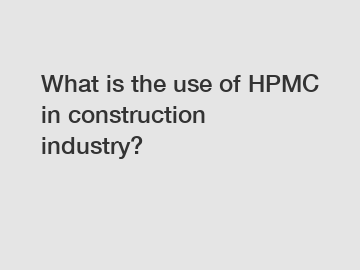What is the use of HPMC in construction industry?
What is the use of HPMC in the construction industry?
HPMC, also known as hydroxypropyl methylcellulose, is a versatile substance which finds wide application in the construction industry. It is derived from cellulose and acts as a thickening agent, binder, and film former, among other functions. This article aims to explore the various uses of HPMC in construction, highlighting its importance, and discussing its impact on the industry.
Primarily, HPMC is utilized as an essential component in cementitious materials. Its unique properties make it an ideal additive in cement-based products, such as mortars, renders, and tile adhesives. The addition of HPMC significantly improves the workability of these materials, allowing for better spreadability, easier application, and enhanced adhesion. Moreover, it imparts cohesive strength and prevents excessive water loss, resulting in reduced cracking and shrinkage.

The use of HPMC in construction materials can be traced back to its exceptional thickening and rheological control capabilities. By acting as a thickener, it imparts a desired consistency to the mix, thereby ensuring an even and smooth application. This characteristic proves particularly beneficial in self-leveling flooring compounds, where an optimum flow is crucial for achieving a uniform finish. The controlled thickening provided by HPMC allows for better control over the fluidity of the mixture, facilitating ease of installation and leveling.
Furthermore, the film-forming properties of HPMC contribute to the durability and weather resistance of construction materials. When added to coatings and sealants, it forms a protective film on the surface, enhancing the material's resistance to water penetration, UV radiation, and other environmental factors. This not only extends the lifespan of the building elements but also reduces the need for frequent maintenance, resulting in cost savings for building owners.
The widespread use of HPMC in the construction industry can be attributed to its numerous benefits. Firstly, it enhances the overall quality of cementitious materials, making them easier to handle, apply, and finish. This, in turn, leads to improved construction efficiency and reduced labor costs. Additionally, the use of HPMC in construction materials contributes to the sustainability of buildings. The improved performance and durability of these materials minimize the need for replacements, leading to reduced waste generation and lower energy consumption.
In conclusion, HPMC plays a vital role in the construction industry by serving as a versatile additive in various materials. Its unique properties, such as thickening, rheological control, and film formation, significantly enhance the quality, workability, and durability of construction materials. The use of HPMC not only improves construction efficiency but also contributes to the sustainability of buildings. As the industry continues to evolve, the demand for HPMC is expected to grow, further emphasizing its importance in modern construction practices.
【Word count: 440 words】.
Want more information on cellulose ether manufacturer, construction HPMC, construction mortar HPMC? Feel free to contact us.
156
0
0


Comments
All Comments (0)